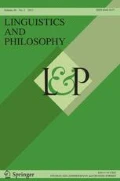REFERENCES
Barker, Chris: 1993, 'A Presuppositional Account of Proportional Ambiguity', in Proceedings from Semantics and Linguistic Theory III, Cornell University, Ithaca, NY.
Dalrymple, Mary, Makoto Kanazawa, Yookyung Kim, Sam Mchombo, and Stanley Peters: 1998, 'Reciprocal Expressions and the Concept of Reciprocity', Linguistics and Philosophy 21, 159–210.
Davies, Martin: 1981, Meaning, Quantification, Necessity, Routledge & Kegan Paul, London.
Heim, Irene: 1982, The Semantics of Definite and Indefinite Noun Phrases, Ph.D. dissertation, Department of Linguistics, University of Massachusetts at Amherst, Amherst, MA. (Published 1988 by Garland, New York.)
Jackson, Eric G.: 1994, Negative Polarity, Definites under Quantification and General Statements, Ph.D. dissertation, Department of Philosophy, Stanford University, Stanford, CA.
Kadmon, Nirit: 1987, On Unique and Non-Unique Reference and Asymmetric Quantification, Ph.D. dissertation, Department of Linguistics, University of Massachusetts at Amherst, Amherst, MA.
Kamp, Hans: 1991, 'Uniqueness Presuppositions and Plural Anaphora in DTT and DRT', in M. Stokhof, J. Groenendijk, and D. Beaver (eds.), Quantification and Anaphora I, Edinburgh (DYANA deliverable R2.2A).
Kanazawa, Makoto: 1994, 'Weak vs. Strong Readings of Donkey Sentences and Monotonicity Inference in a Dynamic Setting', Linguistics and Philosophy 17, 109–158.
Kang, Young Eun Yoon: 1994, Weak and Strong Interpretations of Quantifiers and Definite NPs in English and Korean, Ph.D. dissertation, Department of Linguistics, University of Texas at Austin, Austin, TX. (This is referred to as Yoon 1994 in the text.)
Krifka, Manfred: 1996a, 'Pragmatic Strengthening in Plural Predications and Donkey Sentences', in Teresa Galloway and Justin Spence (eds.), Proceedings from Semantics and Linguistic Theory VI, Cornell University, Ithaca, NY.
Krifka, Manfred: 1996b, 'Parametric Sum Individuals for Plural Anaphora', Linguistics and Philosophy 19, 555–598.
Lappin, Shalom: 1989, 'Donkey Pronouns Unbound', Theoretical Linguistics 15, 263–286.
Lappin, Shalom, and Nissim Francez: 1994, 'E-type Pronouns, I-sums, and Donkey Anaphora', Linguistics and Philosophy 17, 391–428.
Larson, Richard and Gabriel Segal: 1995, Knowledge of Meaning, MIT Press, Cambridge, MA.
Link, Godehard: 1983, 'The Logical Analysis of Plurals and Mass Terms: A Lattice-Theoretical Approach', in R. Bäuerle et al. (eds.), Meaning, Use, and Interpretation of Language, de Gruyter, Berlin. (Reprinted in Godehard Link, 1998, Algebraic Semantics in Language and Philosophy, CSLI Publications, Stanford, CA.)
Neale, Stephen: 1990, Descriptions, MIT Press, Cambridge, MA.
Scha, Remko J. H.: 1984, 'Distributive, Collective and Cumulative Quantification', in Jeroen Groenendijk, Theo M. V. Janssen and Martin Stokhof (eds.), Truth, Interpretation and Information, Foris Publications, Dordrecht, The Netherlands.
Tancredi, Christopher: ms., 'Dynamic Situations', Yokohama National University. (The author is now at the University of Tokyo.)
Yoon, Youngeun: 1996, 'Total and Partial Predicates and the Weak and Strong Interpretations', Natural Language Semantics 4, 217–236.
Author information
Authors and Affiliations
Rights and permissions
About this article
Cite this article
Kanazawa, M. Singular Donkey Pronouns Are Semantically Singular. Linguistics and Philosophy 24, 383–403 (2001). https://doi.org/10.1023/A:1010766724907
Issue Date:
DOI: https://doi.org/10.1023/A:1010766724907

